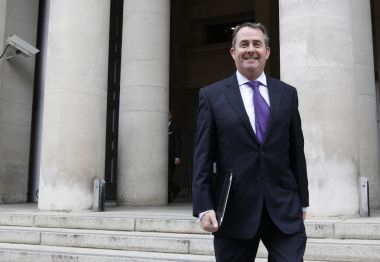Assisted dying is 'Pandora's box' that will fundamentally change society - senior Tory MP

Assisted dying is a "Pandora's box" that will change society in fundamental and unpredictable ways, a senior Conservative politician warned last night.
Liam Fox, former Secretary of State for Defence, told Christian Today that the desire to legislate for assisted suicide was "understandable" but insisted it was still deeply wrong. A former GP, he shares the view of many in the medical profession that such a change in the law would cause irrevocable damage to the traditional doctor patient relationship, built for centuries on the understanding that "Thou shalt not kill".
If passed, Labour MP Rob Marris' Assisted Dying Bill would "enable competent adults who are terminally ill to choose to be provided with medically supervised assistance to end their own life."
"It might be understandable but I think it is wrong," Fox said. "Lots of things are understandable but they are wrong. And I can't see it any other way."
He will speak against the bill on Friday.
"I think it is a Pandora's box that will fundamentally change the ethics of our society in a way most people haven't yet thought about," he said.
"Often the people who support the bill do not understand what this could unleash."
Brought up a Catholic, Fox's views on abortion, same-sex marriage and assisted suicide align with the majority of Conservative Christians. He has spoken openly about his opposition to abortion in particular.
"It says 'thou shalt not kill,' not 'thou shalt not kill unless Parliament says so.' That bit is missing from my version," he said.
However he said his views on assisted suicide are informed by his medical training rather than his Catholic heritage.
Fox, who used to practise as a GP before becoming an MP, spoke about the impact on the medical profession.
"The number one rule of medical profession is 'do no harm,'" he said.
"Doctors don't get involved in executions or torture for the very reason that they are not allowed to harm patients. This changes brutally and profoundly the relationship between doctors and patients."
Fox's comments come after an group of nearly 80 physicians around the country wrote an open letter to MPs warning that allowing doctors to help terminally ill people take their own lives would 'devalue the most vulnerable' in society.
He spoke candidly about treating patients in extreme suffering. Intention, he explained, was key in medical ethics.
"I've been there. I've given patients a big dose of morphine knowing it will most probably end their life but with the primary effect of alleviating their suffering. There is a huge difference morally and ethically between that and giving someone a substance designed to kill them and that, in my view, is unethical and immoral."
The campaign to legalise assisted suicide has focused on choice and the ability of people to decide when and how they die. Lawmaking must think on a wider scale, Fox argued.
"[People who argue in favour of assisted suicide] are understandably thinking that they would do anything they can to alleviate the suffering of the people they care about, but the people who make the law have to consider more than that. We have got to consider the impact on the whole of society."
Here, perhaps, Fox has come across the core issue behind the whole assisted dying debate. For those in favour, choice is fundamental. The notion that one should not or can not have choice is abhorrent. At root, say proponents, this is an individual's decision and Parliament should liberalise the law to allow choice.
But for the opponents to Friday's legislation, this is a communal decision. It is about how we model society. They hold that an individual's decision will never be made in isolation but affects, and is affected by, other people. And so the decision to give a right to die will pressurise people into a duty to die, opponents say.
Fox comes down strongly on the communal perspective.
"This is not just about the patient and the death of the patient but it is about what sort of society we are and how we relate to one another," he said.
"This, I think, would profoundly change us irreversibly."











